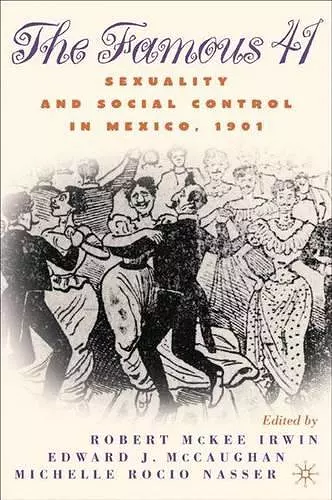Centenary of the Famous 41
Sexuality and Social Control in Mexico,1901
R Irwin editor E McCaughan editor M Nasser editor
Format:Paperback
Publisher:Palgrave USA
Published:25th Mar '03
Should be back in stock very soon

Robert Mckee Irwin is the author of "Mexican Masculinities". He also co-edited "Hispanisms and Homosexualities" (Duke 98) with Sylvia Molloy. Edward J. McCaughan is the author of books on social change in Latin America like "Reinventing Revolution: The Renovation of Left Discourse in Mexico and Cuba" (Westview 97).
However, Mexican cultural trends in literature, art, the sciences, and in journalism were inciting an atmosphere of sexual curiosity that was in search of the right turn of events to ignite a discursive explosion and focus interest on what was not a new phenomenon, but what was about to become a new concept: homosexuality.On November 17, 1901, Mexico City police raided a private party and arrested 41 men, half of whom were dressed as women. Clandestine transvestite balls were not unheard of at this time, and a raid would not normally gain national attention. However, Mexican cultural trends in literature, art, the sciences, and in journalism were inciting an atmosphere of sexual curiosity that was in search of the right turn of events to ignite a discursive explosion and focus interest on what was not a new phenomenon, but what was about to become a new concept: homosexuality. The editors treat the "nefarious" ball as a cultural event in itself and have assembled pictures, including the famous engravings by Posada, and have translated part of an historical novel about the event. At the same time, they uncover the underworld in Mexico City with essays on prison conditions, criminology, mental health discourse, and working class masculinities to create a rare and comprehensive slice of Mexican history at the turn of the century.
'The Centenary of the Famous 41 is a rich contribution to the growing bibliography on the relationship between the state and sexuality. Taking an important case from 1901 in which police interrupted a clandestine party of drag queens in Mexico City, the editors first supply significant archival documentation taken from newspapers, graphic art, and lost fiction of the time and then assemble an impressive collection of scholarly essays to address affirmations of sexual difference and homophobic response in early twentieth century Mexico. Focusing on the politics of visibility and the power of normative law, on the culture of the closet and battles to regulate otherness, the authors offer original and illuminating insights that considerably expand the range of reflection belonging to Latin American cultural studies.' - Francine Masiello, UC Berkeley, author of The Art of Transition
ISBN: 9781403960498
Dimensions: unknown
Weight: unknown
311 pages
2003 ed.